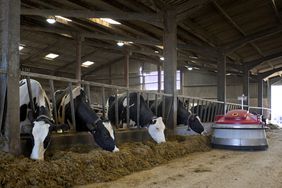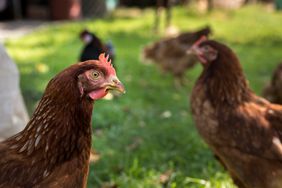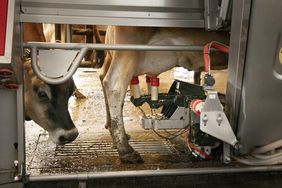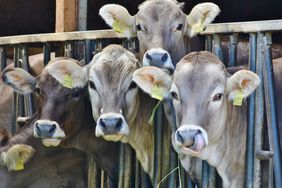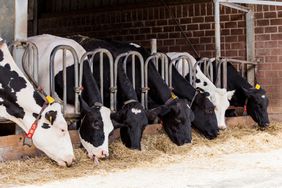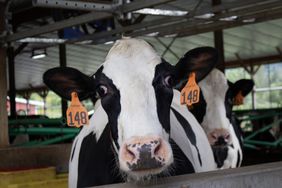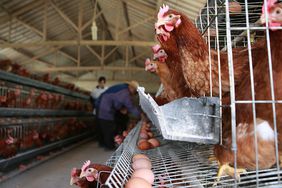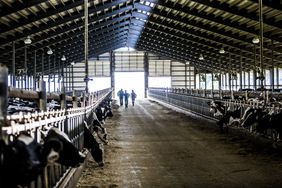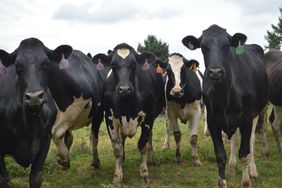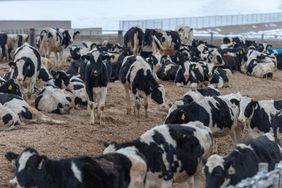:max_bytes(150000):strip_icc()/close-up-dairy-cow-dc4a974299614d40842637af8df4d619.jpg)
A collection of dairy farmers who allege anti-competitive conduct by the nation's largest dairy cooperative will take their case to a jury trial. A U.S. district court judge late last week denied a motion for summary judgment — which would have wrapped the case up without trial — from defendant Dairy Farmers of America (DFA).
The group of more than 115 Northeastern farmers brought the suit against DFA after opting out of a prior lawsuit against the cooperative that resulted in a $50-millionsettlement in 2016. The lawsuit alleges that DFA and its marketing arm, Dairy Marketing Services (DMS), violated the Sherman Antitrust Act by conspiring to monopsonize the fluid milk market. Specifically, farmers allege that DFA and other cooperatives upheld an agreement not to poach one another's farmer-members; shared information about how much they were paying farmers for raw milk in order to discourage competition, resulting in lower prices; and ensured that those low prices were maintained across the market by entering into supply agreements with top dairy processors, including Dean Foods, H.P Hood, Kraft, and others.
In her Friday ruling, U.S. District Judge Christina Reiss, who will preside over the trial, wrote that the plaintiffs put forward "admissible evidence from which a rational jury could conclude that DFA management favored growth of its commercial operations and empire building over the interests of its farmer-members."
If a jury finds in the farmers' favor, there could be wide-ranging implications for the dairy sector and other agricultural cooperatives. Currently, agricultural cooperatives enjoy an exemption from some antitrust scrutiny under the Capper-Volstead Act, a law dating back to when cooperatives were meant to shore up farmers in the market against pressure from powerful middlemen. The farmers in this case would have DFA's behavior ruled beyond the scope of the antitrust immunity granted by Capper-Volstead. They would also have DFA's supply agreements terminated.
DFA did not respond to a request for comment by the time of publication.
DFA is the largest dairy cooperative in the country, with 6,000 employees at 42 manufacturing facilities and over 14,000 farmer-members. It markets about 30 percentof the fluid milk in the country. In the region discussed in this lawsuit, the Northeast Federal Milk Marketing Order, DFA has a 50 percent market share, according to the ruling.
Dairy cooperatives have increasingly been under scrutiny from farmers who say that they operate more like profit-seeking corporations than entities intended to insure farmers' livelihoods. DFA reported net income of over $108 million in 2018, even as more than 2,700 dairy farms went out of business across the country. Cooperative executives' salaries can reach into the millions.
The ire between farmers and cooperatives would seem counterintuitive, since a co-op's farmer-members are also, by definition, its owners. A co-op's interests, then, would seem to be in raising prices for farmers, not suppressing them.
Yet the farmers in this lawsuit argue that DFA's growing business as a processor has introduced a conflict of interest in how the co-op generates income. DFA owns many of its own processing facilities, which could mean that the less DFA pays for milk, the more money it makes from its products. As Harvard Law School Professor Einer R. Elhauge, who is serving as an expert witness for the plaintiffs in the case, put it in court documents, "Reducing raw milk prices [paid to dairy farmers] directly increases DFA's profit per unit as a processor."
And income from processing, which comprised 60 percent of DFA's net income in 2016, is not shared with farmer-members. In 2018, DFA returned just under 50 percent of its net income to its farmer-members.
Additionally, Elhauge's analysis of DFA's income statements found that income from selling its members' raw milk has remained the same "for at least the last ten years," even though the amount paid to members has "ranged from $13.07 to $24.17 per cwt during this period." Thus, Elhauge concludes, DFA "financially benefits from reducing raw milk prices." His estimate of the injury caused to farmers by this alleged conspiracy is 78 cents per hundredweight (one hundred pounds) of fluid milk. In September, the base price of Class I fluid milk was $17.84, according to the USDA.
The suit also discusses DFA's other alleged unsavory business practices, such as coercing independent farmers to join the cooperative. In March 2017, DMS sent a letterto nearly 800 independent dairy farmers announcing they would no longer market the farmers' milk to buyers. Farmers were given the option to find another marketer, or join DFA. According to the ruling, DFA's membership in the Northeast jumped 40 percent that year.
Farmers say that DFA and DMS have warped the market for milk and kept prices low by entering into a series of supply agreements with dairy processors in the Northeast, making it difficult or impossible for independent farmers or non-DFA cooperatives to compete. During the period examined by this suit, those processors included Dean, Hood, Kraft, Fage, Chobani, Sorrento and Turkey Hill.
Farmers also allege that DFA executives and the executives of other dairy cooperatives have agreements not to poach each others' farmer-members, making it nearly impossible for farmers to leave their co-op if they aren't happy. Plaintiffs cite a 2002 correspondence between St. Alban's Cooperative Creamery and DFA in which St. Alban's wrote, "We expect that there would be no active solicitation of members between organizations," and DFA's former CEO Gary Hanman replied, "Obviously—but do we want this in writing—I think not."
